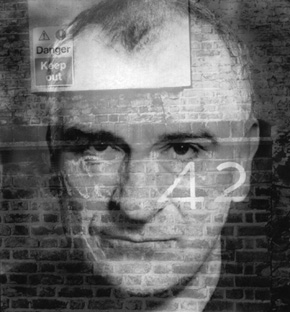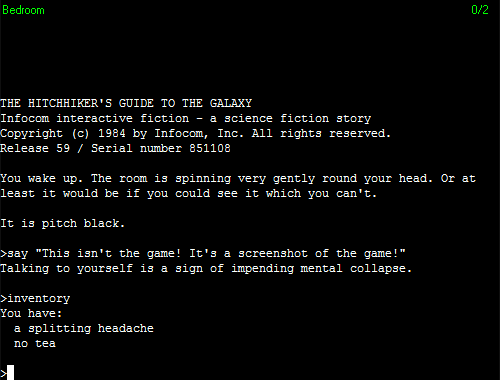So long, and thanks for all the towels
by Andy Miller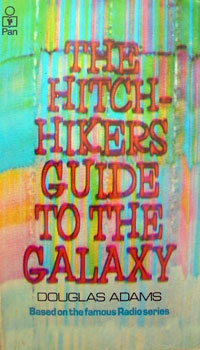
Pan first edition cover, 1979
On the Kindle, I carry around the books I have probably read more times in my life than any other: The Hitchhiker’s Guide to the Galaxy and its four sequels. How splendid it is to have them on an electronic book “with a screen about three inches by four”, like the Guide itself. Douglas Adams would have approved. Unlike me, he was a man who embraced new technologies. Having begun his writing career as a self-confessed “computer dissident” – “I made my living making fun of computers” – he transformed, seemingly overnight, into the epitome of the early adopter. He is said to have owned the first Apple Macintosh in the UK. Was this the machine on which he wrote So Long, and Thanks for All the Fish, the fourth and worst of the Hitchhiker’s books? In creative terms, Adams may have been better served by a humble typewriter, or a pad of paper and a biro. Computers presented the temptation of infinite rewrites, and Adams needed no encouragement in that direction.
Adams was only forty-nine when he died in 2001, a little older than I am now. This was a personal tragedy for his wife Jane and young daughter Polly. His early death also robbed the planet of Adams’ humour, creativity and campaigning energy on behalf of endangered species such as the Bengal Tiger and the Northern White Rhino. And, if one subscribes to either Richard Dawkins’ or Oolon Colluphid’s proof of the non-existence of God, it was also a fatal error for Adams, because by doing something as uncharacteristically stupid as dying, he narrowly missed the techno-uprising he had predicted when he was alive. As his friend and fellow Apple buff Stephen Fry says, what is the confluence of the iPad and the internet if not the Hitchhiker’s Guide to the Galaxy itself, a bank of knowledge compiled by all of us? Of course, such a collaborative mechanism is not without its quirks. “The Hitchhiker’s Guide to the Galaxy is a very unevenly edited book,” wrote Adams presciently, “and contains many passages that simply seemed to its editors like a good idea at the time.”
I met Douglas Adams on several occasions, most recently around the time of his virtual sixtieth birthday party. I would like to briefly describe each one of these meetings. After all, now that several biographies of Adams have been published and one former acquaintance is said to be working on an entire volume about what it was like to be his flatmate, I, like Charles Pooter, fail to see – because I do not happen to be a ‘Somebody’ – why my reminiscences of Douglas Adams should not be interesting. So here they are
On a hot Saturday afternoon, I waited in line for three hours for Adams to sign a copy of his new Hitchhiker’s book, Life, the Universe and Everything. The long wait was not down to the size of the queue, which snaked round the edge of the shop and out the front door. With a certain inevitability, it was because Adams was terribly late.
Not that I minded. Thirteen was probably the peak of my Hitchhiker’s infatuation. I adored the novels, the LPs, the original episodes I had taped off the radio and memorised. On this particular afternoon, I had my towel with me. No one had suggested I do this, it was a spontaneous and hilarious gesture I thought Adams might appreciate; in the event, many of those in the queue ahead of me seemed to have had the same brainwave. At least while we waited, we had something to sit on.
Eventually, from a door near the back of the shop, an exceptionally tall and grumpy-looking man emerged. He marched across to the signing table and, without making eye contact with anyone, began signing books with a gusto that can only be described as furious. In my career, I have encountered many pissed-off authors but none has ever seemed quite so nakedly unhappy as Douglas Adams did that afternoon. But I was thirteen, with a towel, and therefore equipped to screen out anyone’s feelings except my own. As the queue inched forwards, I asked myself what spontaneous and hilarious message I might ask my hero to write. Then I remembered how Zaphod Beeblebrox signed photos of himself in part two of the second radio series of Hitchhiker’s.
“Hello,” I said, as I arrived in front of his table. “Please could you write, ‘To Andy, with frank admiration’?”
Without saying a word or even glancing up, Adams reached over, took a copy of Life, the Universe and Everything from the top of the pile, grimly scribbled the requested dedication – as no doubt he was asked to do every single time he undertook a public signing – and pushed the book across the desk towards me. Nothing further was said and, without so much as a farewell glare, our first meeting was over.
I still have the book, of course. Looking at this inscription now, thirty years later, it occurs to me that ‘frank admiration’ was probably the precise opposite of what Adams was feeling towards us, me and all the other towel-packing dweebs who had dragged him all the way from Islington to Croydon on a hot Saturday afternoon. But I am not sorry I asked.
Institute of Contemporary Arts, The Mall, London, 29 July 1987
Five years have passed. I am now a student at the University of Sussex in Brighton, where I am studying English Literature. I have just completed my first year’s studies and am back at home for the summer holidays. In Time Out magazine, I notice that Douglas Adams will be appearing at the ICA in The Mall to discuss his new novel Dirk Gently’s Holistic Detective Agency. The ICA is where I once met Fat Puffin but I am older now and much, much cleverer; just a few weeks earlier, I sat at the feet of visiting lecturer Ian McEwan and asked him where he got his ideas from. I decide I will do Adams a favour and attend.
At the ICA, Adams is in conversation with his friend and occasional co-writer, TV producer John Lloyd. There must be seventy or eighty people in the audience, several of whom have brought towels with them. Sad! Adams seems far happier and more relaxed than at our last meeting. As the event goes on, I am struck by the disparity between how I have always thought of his work – i.e. funny sci-fi – and how everyone else here seems to think of it – i.e. art, philosophy, science – literature, in other words. But they have all got it wrong. I know literature; I have been studying it for nearly a year. Literature is Ian McEwan. Literature is not Douglas Adams. I must tell everyone this.
My cheeks are burning and I have started to sweat. And with good reason: it dawns on me I have, with ill-concealed rudeness, told Adams to his face that his work is not worth taking seriously.”
When the moment comes for questions from the floor, I raise my hand. Over the course of two minutes and twenty-three seconds, I stammer out a meandering and loaded question which, though I attempt to make it sound impressively lofty and erudite, can be summarised thus: “Are you as surprised as me that everyone here, including you, is taking you so seriously?”
In response, Adams is thoughtful and good-humoured and, wrestling with the baffling pretentiousness of his interlocutor, takes even longer to answer the question than it had taken me to ask it, though in essence his reply can be boiled down to three words: “Yes. And no.”
In my seat in the audience, smiling and nodding while Adams gamely tries to untangle whatever it is I have just asked him – even I’m not sure – I wish I had something to wrap around my head, like a towel. My cheeks are burning and I have started to sweat. And with good reason: it dawns on me I have, with ill-concealed rudeness, told Adams to his face that his work is not worth taking seriously when, actually, it still means more to me than most of the ‘serious’ literature I have studied over the previous nine months. In short, I have behaved like a total dick. At the end of the session, I queue to buy a copy of Dirk Gently’s Holistic Detective Agency and get it signed by the author. This time I am the one who can’t make eye contact. 1
The accidental triumph of The Hitchhiker’s Guide to the Galaxy, I have belatedly realised, is that it is not merely literature but the best kind of literature – highbrow, lowbrow and middlebrow all at once. I say accidental because Adams had no such design in mind when he wrote it and these qualities are bestowed more by the audience than the author. But if you want big ideas about science or art or philosophy, there they are. If you want the poignant tale of a dispossessed man looking for a home, you have it. And if you want jokes – genuine, bona fide funny-ha-ha jokes – making fun of computers, digital watches and ape-descended life forms, no one has ever done it with more originality or genius or craft than Adams. If that isn’t literature, I don’t know what it is.
West London, 1992
Another five years have elapsed. Equipped with an English degree and some opinions, I have managed to find work in a bookshop. I am currently in charge of author events. Douglas Adams is about to publish Mostly Harmless, “the fifth book in the increasingly inaccurately named Hitchhiker’s Guide to the Galaxy trilogy”. I have a proof copy I have already read twice. I call the publisher to see if Adams would like to come and read at our shop, maybe on a Sunday afternoon. They say yes immediately. I put down the phone and start to feel rather nervous.
Though Mostly Harmless is a better book than So Long, and Thanks for All the Fish, it isn’t great. It isn’t nearly as strong as Last Chance to See, Adams’ account of his encounters with such elusive creatures as the Komodo dragon and the kakapo. However, this is not what I am nervous about; if I have learned one valuable lesson over the previous five years, it is to keep my true opinions to myself. No, I am nervous because this will be the third time I have met Douglas Adams and neither of our previous encounters has gone particularly well. I still blush when I recollect what occurred at the ICA and I guess Adams was trying to scrub Croydon from his memory even as it was happening. As the day of the reading approaches, I am not seeking closure or a moment of connection; I just don’t want the event to suck.
“This is Andy,” says the woman from the Pan publicity department. “He’s in charge today.”
“Hi Andy,” says Douglas Adams who, though greying at the temples, remains exceptionally tall. He frowns and glances sharply at me. “Wait a minute. Aren’t you that little prat from the ICA?”
This is what I fear might happen but, of course, it doesn’t.
“I love the new book,” I tell Adams when he actually arrives at the shop. “Absolutely fantastic.” And I usher him upstairs to where a sold-out crowd of admirers awaits, many of whom have reserved seats at the front with towels.
The reading is a huge success and we sell a lot of books. Adams is affable and laughs often. Watching from the back, it occurs to me that he has had to learn how to do this, or at least, how to do it in front of strangers, some of whom inevitably seek to bamboozle him with their in-depth perception of his work – is it hot in here? – or enquire repeatedly if Marvin the Paranoid Android really is dead, his complete absence from Mostly Harmless notwithstanding. And rather than become frustrated or exasperated by this element of his working life, Adams grins and bears it all with politeness and good grace, a forbearance for which he receives my frank admiration.
After the signing is finished and the public have left, by way of thanks we usually let our visiting authors select a book to take away with them. I walk with Douglas Adams down to the basement floor of the shop, where there are heaps of new titles on display, the latest in philosophy and history and science. Flushed with the success of the afternoon, I am seized with the urge to make a grand gesture.
“Take what you want,” I tell him. “As many as you like.”
And I accompany Adams around the basement as he gathers a massive pile of hardbacks for which he does not pay and which I do not have the authority to give away. He asks my advice, I offer it. Several times he asks me if I’m sure about this, it seems very generous, etc., and I wave away his objections with an air of easy and entirely assumed munificence. Effectively, I am aiding and abetting a celebrity shoplifter. But again, thinking back, I am not sorry. For half an hour, it means Douglas Adams and I talked about books.
As Adams climbs into a waiting taxi, after I have helped him in with a clutch of carrier bags containing hundreds of pounds’ worth of stock, he turns and thanks me for a very enjoyable afternoon. And I shake his hand and say what I failed to five years earlier, and five before that.
“Thank you.”
Queen Elizabeth Hall, Southbank Centre, London, March 1998
The twentieth century is almost over. I am now a commissioning editor; I have also started work on a book of my own. The young editor with whom I share an office tells me that Douglas Adams is giving a lecture on the South Bank this evening. He has a spare ticket. Do I want to go with him?
Adams now lives in LA, where he is still trying to get a Hitchhiker’s movie off the ground, but he is currently in London to promote his latest project, an interactive CD-Rom video game called Starship Titanic. Onstage, he is full of enthusiasm, not just for the game as it stands, but for its potential in the future, as processing power increases and more people get involved via the Internet, once something called ‘broadband’ really takes off. After the lecture, my colleague and I eschew the queue for signed copies in favour of a drink in the Festival Hall bar. I don’t mind games but I still prefer books.
The Hitchhiker’s Guide to the Galaxy is not just a multi-brow piece of work; it also pioneered the concept of multi-platform content, back when terms like ‘broadband’ and ‘multi-platform’ were just twinkles in a crossword compiler’s eye. Adams created bespoke variations of Hitchhiker’s for radio, books, TV, audiobook and the theatre; he was still at it twenty years later, producing new drafts of the film script he hoped Disney might option. Starship Titanic had a precursor too; there was a Hitchhiker’s computer game as early as 1984, though back then I lacked a computer to play it on. Some of these versions are more artistically successful than others but Adams was always a confirmed believer in the unique virtues of new media.
Adams’ last project before he died was a four-part radio series for the BBC entitled, to his slight chagrin, The Hitchhiker’s Guide to the Future. The series was an enquiry into how science might affect our lives in the new millennium. The second programme, first broadcast in April 2001, concerned the likely prospects for books in an electronic age. Adams already sounds excited by eBooks and the implications of e-publishing. At about the halfway mark, he offers a typically warm and witty appraisal of the sentimental attachment many of us have – or had – for reconstituted wood-pulp:
“When people talk about their fondness for books, I wonder if they’re really talking about their fondness for reading. It’s rather like confusing the plate for the food. I mean, I like a beautifully printed and bound book as much as anybody else but I don’t need a houseful of them, any more than I need a houseful of beautiful dinner plates. About twelve would do fine; that, and a good recipe book.”
He was right, of course. And yet I can’t help feeling some food tastes better when eaten off a plate; and that, just because science can give us a whole meal in a tablet, we don’t necessarily have to swallow it. In the future, the beautifully printed and bound book may become an endangered species, like the tiger or the kakapo. Surely that’s not what Douglas would have wanted.
In the Festival Hall, we finish our drinks and make for the elevators. The lift doors open, we step inside and I find myself once again in the presence of a giant, Adams being no shorter than the last time we met. He smiles, though I am certain he doesn’t recognise me. Why would he? He is talking to someone; I don’t recall what about – perhaps his baby daughter or some mutual acquaintance or a new piece of tech. I do remember he was laughing. We reach the ground floor. As the elevator doors open, I stand aside to let him and his friend past.
“After you,” I say.
The last time I see him alive he is walking towards Hungerford Bridge, deep in conversation and still laughing. Our paths will not cross again for thirteen years.
Hammersmith Apollo, London, Sunday, 11 March 2012
Douglas Adams may be neither as tall nor alive as he once was but he remains remarkably popular. At his virtual sixtieth birthday party at the Hammersmith Apollo in London, there are towels everywhere. I am in the closing stages of writing my third book. I have taken thousands of baths and eaten many, many sandwiches, as a result of which the book is late to an extent even Adams might find outrageous. This is the first day off I have taken since Christmas.
The proceeds from this virtual birthday party / fan convention / rock concert will go to Save the Rhino, the charity of which Adams was a founding patron. Many of his friends and family are here. On stage, a succession of comedians, writers and scientists tell personal stories about Douglas or explain what he meant to their lives and career choices. For some, Hitchhiker’s was the trigger for a lifelong fascination with physics or astronomy. For others, Last Chance to See inspired them to join the cause of conservation. A couple of the original cast members perform a specially written sketch.
Terry Jones from Monty Python explains how no one read Douglas’s novels for the plot or the characters but for the ideas. It all feels well-meaning but also listless and unfunny. And I sit there and think: I don’t give a monkey’s about physics or astronomy or, if I am being scrupulously honest, the rhino – though I do put ten pounds in a bucket on the way out. These Douglas Adamses seem to have meant a lot to many of the people here but none of them was my Douglas Adams. As a reader, I loved Adams’ ear for humorous inflection, the rhythm and flow of his sentences, the glorious linguistic precision of his phrasing: “mostly harmless”; “total perspective vortex”; “and me with this terrible pain in all the diodes down my left side”; “a liquid that was almost, but not quite, entirely unlike tea”. I read Adams for the words.
I felt the unmistakable thrill of hearing Adams’ voice after a long absence – there were whole passages of original material, unfamiliar and impeccable jokes, wonderful strings of textual DNA; the stuff of life itself. It was great to hear from him again.”
In his introduction to Sunset at Blandings, P.G. Wodehouse’s final, unfinished novel, Adams hails Wodehouse’s comic style as “pure word music… He is the greatest musician of the English language.” He writes of Wodehouse’s “dazzling images and conceits” and his “pure, creative playfulness”, comparing him to Mozart, Einstein and Louis Armstrong. This is how I feel about Adams. He may have been inspired by big ideas and scientific concepts but he played like Louis Armstrong, bending the lyrics and the melody to express the joy of playing itself. I did not bump into this Douglas Adams at his birthday party. Nor, in retrospect, did I ever meet him in person. He rarely ventured out in public, sending forth a tall man called Douglas Adams to speak on his behalf: this was the Adams I encountered over the years and who passed away in 2001. The Douglas Adams who really mattered to me lived – and lives – in those inimitable cascades of pure word music.
The following morning before starting work, after attending to the needs of my wife and son in the customary manner, I logged on to the internet and illegally downloaded a torrent containing sixty computer games from the 1980s and the software with which to play them. The vintage game I was searching for – The Hitchhiker’s Guide to the Galaxy – is available to play legally and for free at douglasadams.com, the BBC website (now in a graphics-rich 30th anniversary edition) and other locations on the web. But bad habits die hard. I installed the software, loaded the game and was rather startled to discover, there in front of me, the late Douglas Adams, alive and well. There was nothing on the screen save for a few brief sentences and a flashing cursor but as I gradually navigated my way through the opening scenes, I felt the unmistakable thrill of hearing Adams’ voice after a long absence – there were whole passages of original material, unfamiliar and impeccable jokes, wonderful strings of textual DNA; the stuff of life itself. It was great to hear from him again.
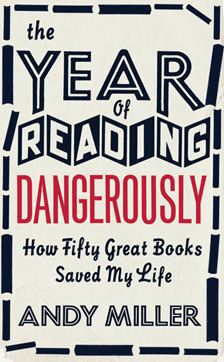 Interactive Literature, Adams called it, a form of authorship which played to the strengths of the medium for which it was created, allowing the reader to decide the outcome of the story. He was delighted with the new possibilities it offered him and writers like him; equally, he never underestimated the centuries-old power of words on a page, arranged in set, unchanging lines. He was a man who loved Wodehouse, Dickens and Austen. He never lost his faith in the realignment of the synapses that occurs every time we pick up a good book and start reading, find something that interests us or makes us turn to the next page, so much so that when we look up, the world has changed.
Interactive Literature, Adams called it, a form of authorship which played to the strengths of the medium for which it was created, allowing the reader to decide the outcome of the story. He was delighted with the new possibilities it offered him and writers like him; equally, he never underestimated the centuries-old power of words on a page, arranged in set, unchanging lines. He was a man who loved Wodehouse, Dickens and Austen. He never lost his faith in the realignment of the synapses that occurs every time we pick up a good book and start reading, find something that interests us or makes us turn to the next page, so much so that when we look up, the world has changed.
This is the abiding miracle of the book. We choose what happens next.
Extracted from The Year of Reading Dangerously: How Fifty Great Books (and Two Not-So-Great Ones) Saved My Life.
1 I am able to tell you with absolute certainty that the question took me two minutes and twenty-three seconds to ask – but felt much longer – because I recently discovered to my absolute horror that the whole of Adams’ interview at the ICA is now available to listen to online, as is my excruciating contribution from the audience. Twenty-five years on, it is even more mortifying than I remember it. If anyone reading this has a time machine and is thinking of going back to kill Hitler at birth, would you mind stopping off in The Mall in 1987 to kill me first? Thanks. Worst of all, this unwelcome entrance to the past has been propped open courtesy of the British Library. You people were meant to be my friends!
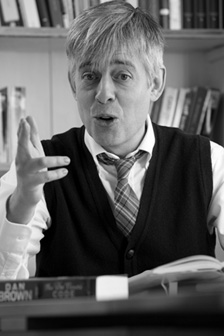 Andy Miller is a reader, author and editor of books. His writing has appeared in The Times, the Telegraph, the Guardian, the Independent, Esquire, Mojo and more. The Year of Reading Dangerously is published by Fourth Estate in hardback and eBook. Read more.
Andy Miller is a reader, author and editor of books. His writing has appeared in The Times, the Telegraph, the Guardian, the Independent, Esquire, Mojo and more. The Year of Reading Dangerously is published by Fourth Estate in hardback and eBook. Read more.
mill-i-am.com
Read Andy’s READ Y’SELF FITTER tour diary
The five books of Douglas Adams’ Hitchiker’s trilogy are published by Pan Macmillan in numerous editions in paperback, eBook and as digital downloads. Read more.

